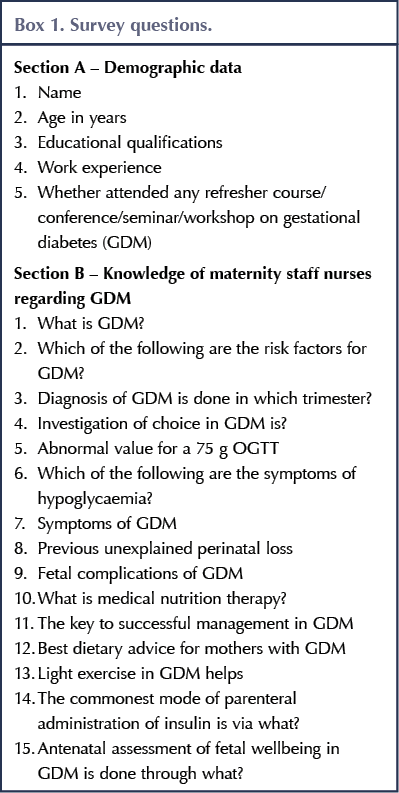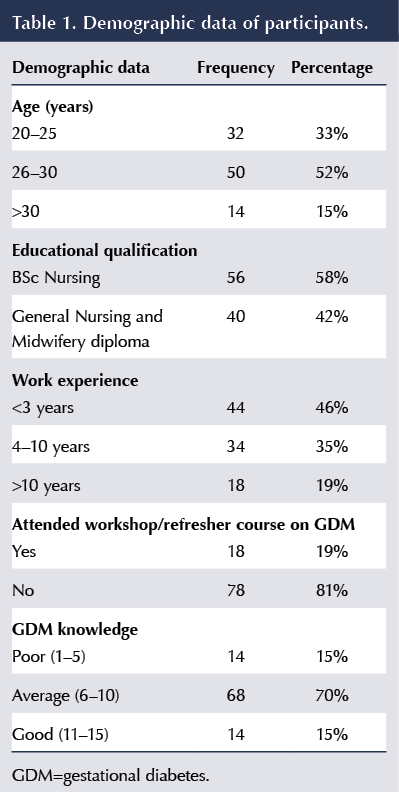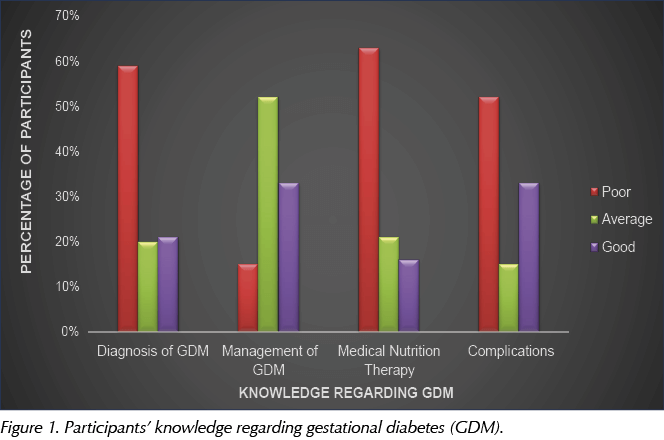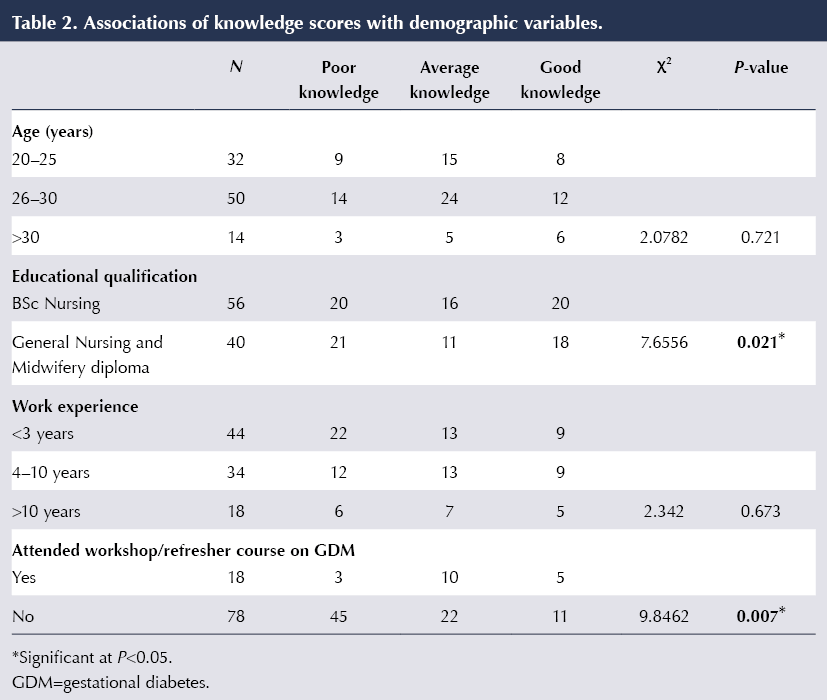Gestational diabetes (GDM) is defined as impaired glucose tolerance (IGT) with onset or first recognition during pregnancy. Worldwide, one in ten pregnancies is associated with diabetes, and 90% of these cases are GDM. Undiagnosed or inadequately treated GDM can lead to significant maternal and fetal complications (Ministry of Health and Family Welfare, 2018).
In India, one of the most populous countries globally, rates of GDM are estimated to be 10.0–14.3%, which is much higher than in the West. As of 2010, there were an estimated 22 million women with diabetes between the ages of 20 and 39 years, as well as 54 million women with IGT or pre-diabetes, with the potential to develop GDM if they become pregnant, in this age group. In a field study conducted in the state of Tamil Nadu, of the 4151, 3960 and 3945 pregnant women screened in urban, semi-urban and rural areas, respectively, the prevalence of GDM was 17.8%, 13.8% and 9.9% (Seshiah et al, 2008).
Diagnosis of GDM in a woman predisposes her and her offspring to developing glucose intolerance and obesity in the future. GDM may play a crucial role in the increasing prevalence of diabetes and obesity and, hence, has become a public health priority (Veeraswamy et al, 2012). Furthermore, GDM carries risks for the mother and neonate. The large, multinational HAPO (Hyperglycemia and Adverse Pregnancy Outcomes) cohort study demonstrated that risk of adverse maternal, fetal and neonatal outcomes continuously increased as a function of maternal blood glucose levels at 24–28 weeks, even within ranges that were previously considered normal for pregnancy (HAPO Study Cooperative Research Group, 2008). For most complications, there was no threshold for risk. These results have led to careful reconsideration of the diagnostic criteria for GDM (American Diabetes Association, 2016).
First-level healthcare providers, particularly nurses and midwives, are usually the first point of contact for pregnant women. The aim of the present study was to assess the knowledge and current practices of nurses and midwives working at primary and secondary healthcare facilities.
Study objectives
1. To assess the knowledge of staff nurses working in maternity services regarding GDM.
2. To associate the knowledge of staff nurses regarding GDM with selected demographic variables.
Materials and methods
A total of 96 staff nurses working in the maternity units of nine hospitals in Aurangabad district in Maharashtra, India, were recruited using non-probability purposive sampling. The units included one teaching hospital, five private maternity hospitals and three primary health centres. Nurses working in the maternity ward, labour room, postnatal ward and antenatal ward were included in the study. Formal permission was obtained from the concerned hospital authorities, and written informed consent was obtained from the participants. Participants were assured of confidentiality and anonymity regarding the data collected. The research topic was approved by the Institutional Ethics Committee of MGM Mother Teresa College of Nursing, Aurangabad.
A self-structured questionnaire was constructed, which consisted of two sections. Section A comprised demographic data, while section B comprised a knowledge questionnaire on various aspects of GDM (Box 1). The questions in section B were scored as 1 for a correct answer and 0 for a wrong answer.
The questionnaire was validated by experts from the field of obstetrics and gynaecological nursing, diabetology and medicine. The questionnaire was also pilot-tested for reliability using the split-half method; the resulting coefficient was 0.87, indicating high reliability.
The knowledge of staff nurses was assessed with the questionnaire and was categorised according to score as poor (1–5), average (6–10) or good (11–15). Chi-squared tests were used to determine the associations between knowledge scores and demographic variables.

Results
In total, 96 responses were recorded. Table 1 depicts that the majority of participants were aged 26–30 years, 58% were nursing graduates and 46% had working experience of less than 3 years, while only 19% had work experience of more than 10 years. Only 19% had attended any training or refresher courses on management of GDM.

Knowledge regarding GDM
The majority of the participants, 70%, had average knowledge regarding GDM while 15% had poor knowledge and 15% good knowledge scores.
Figure 1 depicts the area-wise distribution of knowledge of the participants regarding GDM. It shows that most nurses (59%)had poor knowledge regarding diagnosis of GDM, while the majority (52%) had average knowledge regarding management of the condition. It was also concluded that 63% and 52% of the participants had poor knowledge regarding medical nutrition therapy and complications of GDM, respectively.

Table 2 shows that the educational qualification of nurses and attendance at any training or refresher courses regarding GDM were significantly associated with overall knowledge scores. Those nurses who were qualified with a BSc in nursing were more likely to have good knowledge scores, as were those who had attended a training or refresher course on GDM.

Discussion
Utz et al (2017) conducted a study to assess the knowledge and practices related to GDM among primary healthcare providers in Morocco. Although 56.8% of the doctors had some pre-service training on GDM, most nurses and midwives lacked such training. The present study also concludes that the majority of nurses working in maternity units have average knowledge regarding GDM and its management.
Devi et al (2020) conducted a study to assess the effect of an education programme on GDM knowledge among nurses in Pune, India. Mean GDM knowledge scores increased from 14.0 to 15.4, and the awareness programme was found to be effective in refining the awareness of nurses regarding GDM. The current study also shows that training is associated with improved knowledge regarding GDM and suggests that nurses have inadequate knowledge regarding certain aspects of the management of GDM, and thus need training.
Kukreti et al (2020) assessed the effectiveness of national guidelines on diagnosis and managing GDM, developed by the Indian Ministry of Health and Family Welfare, in terms of knowledge among Nurse Educators in selected colleges of nursing in New Delhi. The findings suggested that the majority had good knowledge regarding general aspects of GDM and average knowledge regarding screening of mothers for the condition. The majority had average knowledge regarding assessment and diagnosis of GDM, management and follow-up of patients. The present study also supports these findings.
Conclusion
For frontline healthcare providers, updating knowledge and skills is very important to tackle complex pregnancy conditions and related adverse pregnancy outcomes. From the study findings, it can be concluded that is important to equip nurses to tackle high-risk pregnancy conditions such as GDM.






Helping homeless adults to overcome the challenges of managing their condition.
16 Apr 2024